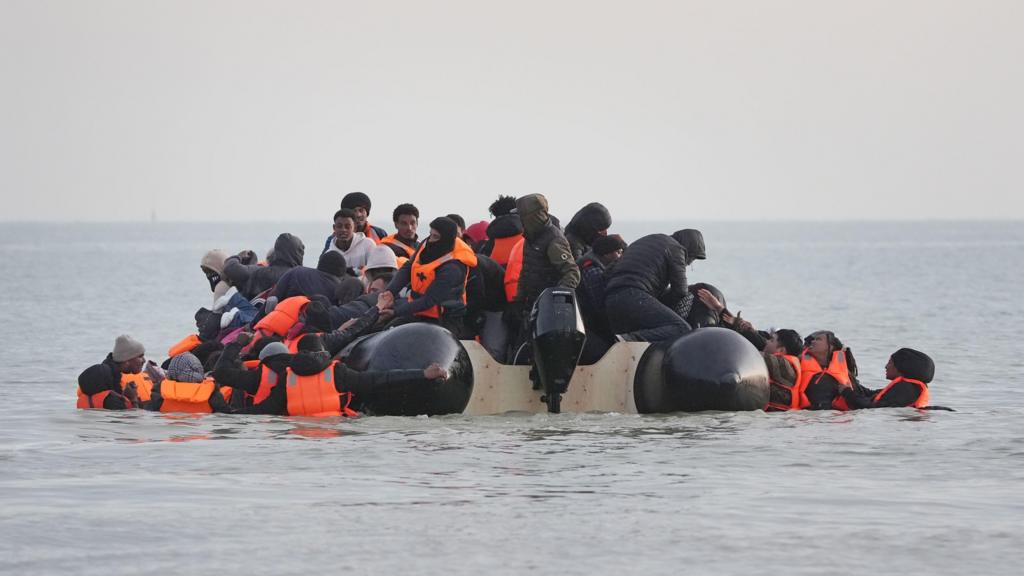Nearly 20,000 individuals have arrived in the UK during the first half of this year after crossing the English Channel in small boats, marking a 48% increase compared to the same period in 2024.
Just under 1,500 individuals have made the crossing since Sunday, bringing the total to 19,982 by the end of June, according to the latest figures released by the Home Office.
The figure for the first six months of 2025 is also 75% higher than the corresponding figure for 2023, which stood at 11,433.
The Conservative Party has described the situation as a government “failure,” setting “a new national record”.
Government ministers have previously attributed the surge in migration crossings to favorable weather conditions and the willingness of human smugglers to transport more individuals on boats.
Since assuming power in July of last year, the Labour Party has announced several measures aimed at combating human smuggling, including a new criminal offense for endangering lives at sea.
Legislation currently under consideration in Parliament outlines plans to utilize counter-terrorism powers against human smugglers, with suspects potentially facing travel bans, social media restrictions, and limitations on phone usage.
However, the latest data indicates that 2025 has already established a new record for small boat arrivals in the first half of the year, since records began in 2018.
In 2024, Home Office figures documented 13,489 individuals arriving in the UK via small boats during the first half of the year. In 2023, the figure was 11,433, slightly lower than the 12,747 recorded the previous year.
Addressing small boat crossings is expected to be a key discussion point during French President Emmanuel Macron’s upcoming visit to the UK, following Downing Street’s statement last month that the situation in the English Channel was “deteriorating.”
French authorities are reportedly considering authorizing police or coast guard intervention in shallow waters to intercept so-called “taxi boats” that collect migrants from beaches.
Furthermore, London and Paris are reportedly engaged in negotiations for an agreement that would allow the UK to return some Channel migrants to France in exchange for accepting asylum seekers from France seeking family reunification in Britain.
On Monday, the European Commission, the EU’s executive arm, announced that it had contacted the UK government to “seek clarity” on the potential agreement, after five member states voiced criticism of the proposals.
Italy, Spain, Greece, Malta, and Cyprus cautioned in a letter seen by the Financial Times that the deal could result in individuals being deported from the UK to their respective countries.
A Commission spokesperson described the increasing number of Channel migrants as “alarming” but emphasized that it would only accept “solutions that are compatible with the spirit and letter of EU law.”
Shadow Home Secretary Chris Philp attributed the increase to Labour “tearing up” the previous Conservative government’s plan to deport some asylum seekers to Rwanda shortly after assuming office.
Philp stated, “This is the worst year on record, and it’s become a free-for-all.”
“We need a removals deterrent so every single illegal immigrant who arrives is removed to a location outside Europe. The crossings will then rapidly stop.”
A Home Office spokesperson stated that the “government has put together a serious plan to take down these networks at every stage.”
This morning near Dunkirk, the BBC witnessed a boat carrying around 20 migrants making its way to the beach to pick more people. But it developed engine trouble and started drifting.
The police got the people off the boat, but they were allowed to head back into town without being questioned about what had happened.
Officers did however slash the dinghy to make sure it could not be used in another crossing attempt.
Several boats have launched from other beaches and waterways along the coast of northern France.
The number of crossings can vary according to factors like the weather and the supply of boat parts.
Last month, the Home Office released figures showing that the number of “red days” – when conditions are considered favorable for small boat crossings – peaked in 2024-25.
But Dr Madeleine Sumption, head of Oxford University’s Migration Observatory, said there was “no evidence to suggest that the weather is a major factor explaining long-term increases in small boat arrivals.
“The data published today suggest that over long periods of a year, the number of crossings seems to be broadly unrelated to the number of ‘red’ days.
“Other factors, such as the number of people wanting to reach the UK and the number and professionalisation of smuggling gangs are likely to be more important,” she added.
Sign up for our Politics Essential newsletter to keep up with the inner workings of Westminster and beyond.
Lives in Motion features 51 stories of migration from the National Portrait Gallery’s collection.
The migrants were deported to Costa Rica in February after the two countries struck a deal.
It comes after reports that asylum seekers are able to work for couriers shortly after reaching UK.
Windrush Day celebrates the contribution Caribbean migrants and their families have made to the UK.
The rescued man is believed to be a migrant that had attempted to cross the English Channel.

